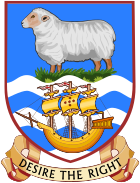| Chief Executive of the Falkland Islands | |
|---|---|
 Arms of His Majesty's Arms of His Majesty's Falkland Islands Government | |
| Incumbent Andy Keeling since 5 April 2021 | |
| Executive Council of the Falkland Islands Government of the Falkland Islands | |
| Style | The Honourable |
| Appointer | Governor of the Falkland Islands |
| Term length | At the governor's pleasure |
| Formation | December 1983 |
| First holder | David G. P. Taylor |
| Website | Office of the Chief Executive |
| Politics of the Falkland Islands |
|---|
 |
| Constitution |
| The Crown |
Government
|
| Legislature |
Judiciary
|
| Elections |
| Other |
The chief executive of the Falklands Islands is head of the public service responsible for the efficient and effective management of the Falkland Islands Government. The appointment, role and powers of the chief executive are set out in the Constitution of the Falkland Islands.
History
Since the re-establishment of British rule on the Falkland Islands in the 19th century, the governor, through consultation with the elected Legislative Council of the Falkland Islands, had almost complete control over executive power on the Falklands.
Following the Falklands War in 1982, Lord Shackleton published a report on the Government of the Falkland Islands which recommended many modernisations, including the creation of the office of the chief executive to which many powers of the governor were delegated. In 1983 David G. P. Taylor became the first chief executive of the Falkland Islands and in 1985 the Constitution of the Falklands came into force, formalising the office. In 2009 a new constitution was established which further defined the role and powers of the chief executive.
Appointment and powers
The chief executive is a civil service position, appointed by the governor on the advice of the executive council. The executive council normally makes its selection through the use of a committee and the chief executive serves a term of three years, which can be extend a further two years at the request of the executive council.
Under Section 83 of the constitution, the chief executive is officially the head of the public service on the islands and the governor can delegate some of the powers of his or her office to the chief executive. In this role, the chief executive is responsible for the implementation of decisions across government, and the efficient and effective management of the government. This includes the generation and analysis of strategy and policy options for the consideration of the Legislative Assembly.
The chief executive is an ex officio member of the Legislative Assembly, the executive council and the Advisory Committee on the Prerogative of Mercy, and also acts as Stanley's returning officer during general elections.
List of chief executives
| Name | Entered office | Left office |
|---|---|---|
| David G. P. Taylor | December 1983 | April 1987 |
| Brian Cummings | April 1987 | May 1988 |
| Colin Redston (acting) | June 1988 | August 1988 |
| Rex Browning (acting) | August 1988 | September 1988 |
| David G. P. Taylor (interim) (2nd time) | September 1988 | April 1989 |
| Ronald Sampson | April 1989 | September 1994 |
| Andrew Gurr | September 1994 | November 1999 |
| Michael Blanch | January 2000 | March 2003 |
| Chris Simpkins | March 2003 | 12 September 2007 |
| Michael Blanch (interim) (2nd time) | 12 September 2007 | 3 January 2008 |
| Tim Thorogood | 3 January 2008 | 1 February 2012 |
| Keith Padgett | 1 February 2012 | 3 October 2016 |
| Barry Rowland | 3 October 2016 | April 2021 |
| Andy Keeling | April 2021 | Present |
See also
References
- "Andy Keeling: New Chief Executive to arrive in the Falklands next week". MercoPress. 23 March 2021.
- "Falkland Islands Government Chief Executive" (PDF). Retrieved 6 February 2023.
- "The Falkland Islands Constitution Order 2008 Section 83". legislation.gov.uk. Retrieved 6 February 2023.
- "Falkland Islands (Shackleton Report)". Hansard Parliament UK. Retrieved 6 February 2023.
- "David Taylor". The Guardian. Retrieved 6 February 2023.
- "The Falkland Islands Constitution Order 1985" (PDF). legislation.gov.uk. Retrieved 6 February 2023.
- "The Falkland Islands Constitution Order 2008 Section 83". legislation.gov.uk. Retrieved 6 February 2023.
- "Falkland Islands Government (FIG)". Falkland Islands Government.
- "Falkland Islands Government Chief Executive" (PDF). Retrieved 6 February 2023.
| Chief executives of the Falkland Islands | ||
|---|---|---|
 | ||
| Heads of governments of the British Overseas Territories and Crown Dependencies | |||||||||||||||||||||||||||||||||||||||||||||||||||||||||||||||||||||||||||||||
|---|---|---|---|---|---|---|---|---|---|---|---|---|---|---|---|---|---|---|---|---|---|---|---|---|---|---|---|---|---|---|---|---|---|---|---|---|---|---|---|---|---|---|---|---|---|---|---|---|---|---|---|---|---|---|---|---|---|---|---|---|---|---|---|---|---|---|---|---|---|---|---|---|---|---|---|---|---|---|---|
| |||||||||||||||||||||||||||||||||||||||||||||||||||||||||||||||||||||||||||||||
| List of current heads of government in the United Kingdom and dependencies | |||||||||||||
|---|---|---|---|---|---|---|---|---|---|---|---|---|---|
| |||||||||||||